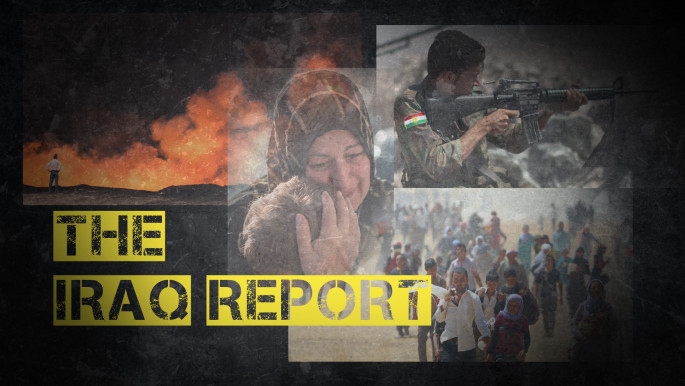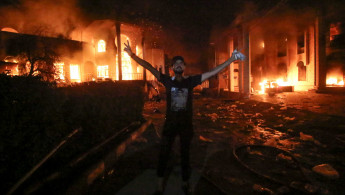The Iraq Report: Iran doubles down in Iraq as Basra rages on
Iran has effectively doubled down on its strategic deployment in Iraq as it dawns on Tehran that its position in its weaker western neighbour is not as secure as it once was.
The Iranian regime has faced several threats from within Iraq in the past week, including from Kurdish militants in the north and Shia Arabs tired of Iranian hegemony in the south. This has forced Iran to expand its presence both diplomatically and militarily, while assessing its options vis a vis its proxies on the ground.
Events in Basra have worsened as the caretaker government has failed to quell the public's anger over severe power and drinking water shortages - more than 30,000 people were hospitalised after drinking polluted water and corrupt local and national administrators have been blamed by many here.
The authorities have imposed a curfew following further clashes between protesters and security forces, as well as the torching of the Iranian consulate in a significant symbolic gesture by Iraq's Shia community - who feel their national sovereignty and self-determination is being undermined.
As Mosul is slowly and painstakingly reconstructed, public fury against Iran and its proxies may provide the common ground Iraq's ethno-sectarian groups need to reforge their shattered national identity.
Basra on lockdown
The Iraqi military put Basra on lockdown last Thursday after fury over police brutality and the killings of several protesters led a mob to torch a government building in downtown Basra.
Security forces had hoped to quell the continuing violence between demonstrators and the police through detentions and brutality, leading election winner Muqtada al-Sadr to denounce troop violence against "defenceless protesters" on Twitter.
Twitter Post
|
The security measures proved futile, however, as demonstrators set upon the headquarters of several pro-Iran political parties and Shia Islamist militias as they did during unrest over the summer over similar concerns.
A flurry of violence followed, with security forces shooting dead four demonstrators and wounding 81 last Thursday, subsequently denounced by the Iraqi Human Rights Commission who blamed the authorities for the clashes.
Taking their anger a step further in retaliation, protesters attacked the Iranian consulate in Basra, setting it ablaze.
The decision to attack a foreign power's diplomatic mission is telling of how Iraqis in general feel about Iranian interference in their country's affairs.
Twitter Post
|
Tehran is inextricably linked to most of the Shia Islamist parties in power in Baghdad today, while also enjoying great influence over several Kurdish and Sunni groups, including the Patriotic Union of Kurdistan (PUK) and Iraqi Islamic Party (IIP) respectively.
While Iran dominates and co-opts this broad spectrum of Iraqi political players to serve its wider regional agenda, its actions are undermining the way it is perceived.
While Iraqi politicians are frequently heard praising Iran as a good neighbour which stepped in to help the country against al-Qaeda, the Islamic State group and other insurgents, it is becoming increasingly common to hear normal Iraqis across the ethno-sectarian divide criticising Tehran and its client politicians and militia commanders in Baghdad.
The patriotic credentials of many of these political operators are so low that very few denounced the shelling of Baghdad's heavily fortified Green Zone with mortar fire early last Friday night. The Green Zone is where parliament sits and most foreign diplomatic missions are headquartered, including the United States embassy.
Such brazen assaults on the seat of Iraqi political power are indicative of the growing disillusionment with the political process.
A day later, an unidentified group fired a salvo of Katyusha rockets targeting Basra International Airport. The illegal arms trade in Iraq is still rife with Soviet-era weapons technology, and while several of Iran's militant proxies possess Katyushas, so do tribal fighters who openly came out in support of the Basra protesters days before the attack.
 |
| Basra's local government complex was severely damaged in the protests [AFP] |
Iran increases military, diplomatic footprint
As Iraq is the linchpin to much of Iran's strategic game plan in the region, it cannot afford to lose control over it.
On Tuesdya, just days after the Iranian mission in Basra was burned down, Iran's ambassador, Iraj Masjedi, presided over an inauguration ceremony for a new consulate. Masjedi said that those who had attempted to create "divisions" between Iraq and Iran had failed, and that his country would remain committed to its Iraqi presence.
Iranian interests were not only damaged by the burning down of its consulate in a Shia-dominated area, but it has also faced resistance from separatist Iranian Kurdish militants who have made northern Iraq their base from which to strike against Tehran's regime.
Iran's Islamic Revolutionary Guard Corps (IRGC) launched a deadly missile strike on Saturday against the Kurdistan Democratic Party of Iran (KDPI) on Iraqi soil, boasting "the terrorists' headquarters… was successfully struck by seven surface-to-surface rockets".
A KDPI spokesman confirmed that 15 of its members were killed in the Iranian attack, while local medical sources said 30 others were admitted to hospital.
Ratcheting up its actions against the Kurds - and proving to all and sundry that it does not need permission when operating on Iraqi territory - the Iranian military penetrated some 20 kilometres into Iraq on Tuesday and occupied a mountain range.
This is not the first time Iran has invaded Iraqi territory since the US-led invasion in 2003. Iran has often deployed military forces in Iraq - its most high-profile being when IRGC Quds Force commander Major General Qassem Soleimani was dispatched alongside "military advisers" to organise the Iraqi response to IS.
Twitter Post
|
In 2009, Iranian troops also crossed the border, invaded the Fakkah oil field, and replaced the Iraqi national flag with the Iranian.
Iranian moves against the KDPI also come at a time when Kurdish politicians are campaigning for the upcoming elections in the Kurdistan Region of Iraq. The Kurdistan Democratic Party (KDP) led by Masoud Barzani has dominated the Kurdistan Regional Government for more than a decade. However, this could be challenged after the KDP-led Iraqi Kurdish independence bid last year backfired spectacularly.
Iraqi Kurds - who are expected to turn out in low numbers - may also question what their political leadership have been doing to support their Iranian brethren.
Mosul reconstruction sees slow progress
While Basra and the Iraqi south have dominated headlines since the summer, the north and in particular Mosul have slowly crept back onto the global agenda.
The United Nations' cultural agency (UNESCO) wants to use the reconstruction of Mosul as a way to restore its international credibility and revive the multilateral order, its director general said on Monday.
Twitter Post
|
UNESCO was thrown into turmoil last year when the United States withdrew from the organisation and ceased funding, citing "anti-Israel bias".
A year later, Director General Audrey Azoulay seeks to place the reconstruction of Mosul at the centre of efforts to refocus the agency on its fundamental mandate.
"At a time when multilateralism is sometimes being questioned, the objective and magnitude of this initiative shows exactly why an organisation like UNESCO is important," Azoulay told Reuters ahead of a Paris conference on Mosul.
The UN cultural body is partnering with the Iraqi government and is seeking to place itself as a coordinator for rebuilding some of the city's most cherished landmarks which were destroyed during fighting.
"We're fully aware of Mosul's specificities and the difficulties on the ground... but it's exactly because the situation is still fragile that we need to act," Azoulay said.
While it is unlikely Mosul's reconstruction will be completed anytime soon, particularly considering the dearth in funding and political will in Baghdad - two hospitals destroyed by Iraqi government and US-led coalition airstrikes have now been reopened.
This will be welcome news to the people of Mosul, but the incredibly slow pace of reconstruction there and in other Sunni Arab cities destroyed in recent years - such as Ramadi, Tikrit and Fallujah - has left many residents feeling neglected by their government. Such sentiments are easily inflamed and could lead to a further outbreak of civil disturbance, mirroring what is happening in Basra today.
Read the full series here:




